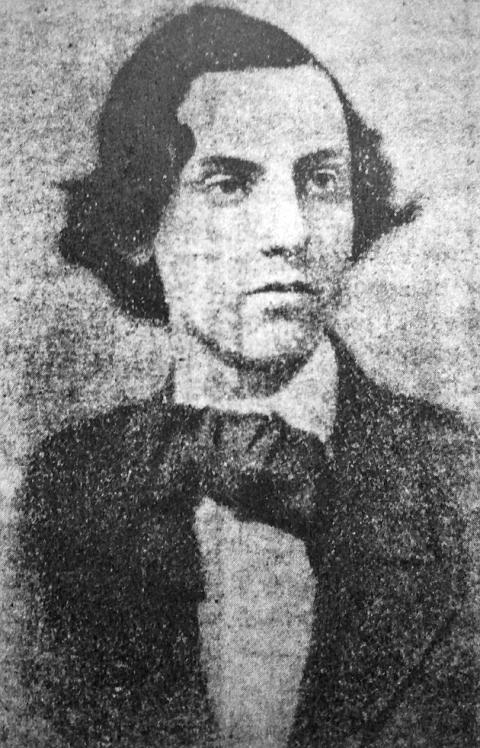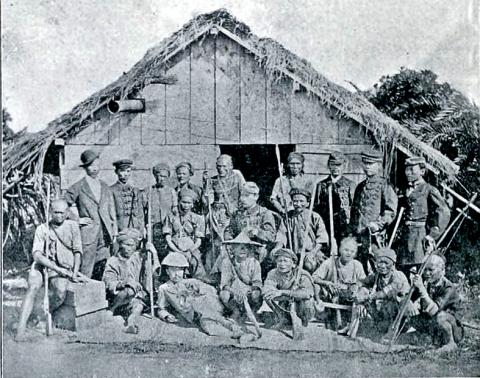In early May 1874, just 20 years after US Commodore Matthew Perry forcefully opened up the isolationist empire to the rest of the world, Japanese troops headed outside of Japan’s borders for the first time in more than 200 years. Their destination: Taiwan.
With them was Edward Howard House, a Bostonian musical prodigy who moved to New York and became a drama critic. During the American Civil War, House served as correspondent for the New York Tribune, almost getting shot in the process.
He traveled to Japan in 1870 when the country was still in political strife as a stringer for the Tribune and later for the New York Times. He also worked as an English professor and founded the English-language Tokio Times.

Photo: Han Cheung, Taipei Times
House accompanied the Japanese troops to Taiwan as a correspondent for the New York Herald, and a year later published The Japanese Expedition to Formosa, a first-person account of what would later be known locally as the Mudan Incident (牡丹社事件).
THE MUDAN INCIDENT
The story originates in late 1871, when two ships from the Kingdom of Ryukyu were blown off course during a storm and were shipwrecked in Taiwan, which was then controlled by a Qing Dynasty with little desire to develop it. One ship landed in the prefectural capital of Tainan without much incident, but the other ended up further south, near today’s Manjhou Township (滿州) in Pingtung.

Courtesy of Wikimedia Commons
Sixty-six passengers made it to land, where they met two Han Chinese who seized their possessions but warned them not to head west where they would meet the headhunting “big ear ghosts.” Distrusting of the men, the castaways headed west anyways — and indeed encountered the “ghosts,” which were Paiwan Aborigines with stretched earlobes.
The Aborigines gave them food and shelter, but forbade them from leaving the village until they came back from a hunting trip. When the sailors escaped, the Aborigines followed and killed 54 of them, the rest being rescued by Han Chinese settlers and taken to safety to Tainan.
The Qing Dynasty, who had no control over the southern (or eastern) Aborigines, refused, or was simply unable, to help, and the event became an excuse for the fledgling Meiji government to attempt a take over of the non-Qing controlled areas of Taiwan and also assert its authority over Ryukyu, which paid tribute to China.
The Japanese government hesitated after opposition by the UK and the US — but on April 27, 1872, expedition commander Saigo Judo refused to wait anymore, defying orders and setting sail on the Yuko Maru. House was on this ship.
LIFE IN HENGCHUN
House’s account was more than just a war journal, as there was not a whole lot of action outside of minor skirmishes and guerrilla attacks except for a three-pronged assault on the Paiwan settlement of Mudan, whose villagers were not responsible for killing the sailors but refused to participate in negotiations.
Of course, there are the supremacist comments, for example this passage describing a Han Chinese settler: “[He] was singularly gifted with good looks, for one of his race.” In fact, he comments on the good looking-ness of practically every person he writes about.
But there are also thoughtful observations: “[The settlers] have a sort of openness and independence of bearing that would not be found in a crowded Chinese city, which is doubtless attributable to their freedom from oppressive authority and self-reliant ways of life.”
Much of the time was spent making military preparations and negotiating in Han Chinese settlements. House notices the prevalence of weapons here — guns, scabbards, bows with iron arrows, spears and lances, all “displayed conspicuously” — a testament to the lawlessness of the area.
There are culture clashes, such as when the Japanese soldiers stripped and started bathing in water tubs in plain sight in the village, which caused a stir. Locals relentlessly pestered the troops to let them try the Gatling guns — even coming up with various schemes — to no avail.
Also interesting was that when the Japanese hired 400 locals to help them build the camp, many who showed up were women with children still strapped to their backs and elderly — and there was even a blind man. House describes them as unruly and inefficient, even taking up their guns and going on strike for higher wages at one point.
The book goes on and follows the military operations, negotiations with Aborigines and later-arriving Chinese officials and tropical epidemics among Japanese troops — but it is the descriptions of everyday life in a wild and lawless Taiwan that sets it apart from other books on the incident.
By the end of the incident, Japan had mobilized more than 6,000 people and spent far more than the reparations it received from the Qing. While the expedition paved the way to the empire’s eventual annexation of Ryukyu, all the troops retreated with no territorial gains in Taiwan.
It did not matter anyway, as just 20 years later, Japan got more than the Aborigine areas — it swallowed Taiwan entirely.
Taiwan in Time, a column about Taiwan’s history that is published every Sunday, spotlights important or interesting events around the nation that have anniversaries this week.

A vaccine to fight dementia? It turns out there may already be one — shots that prevent painful shingles also appear to protect aging brains. A new study found shingles vaccination cut older adults’ risk of developing dementia over the next seven years by 20 percent. The research, published Wednesday in the journal Nature, is part of growing understanding about how many factors influence brain health as we age — and what we can do about it. “It’s a very robust finding,” said lead researcher Pascal Geldsetzer of Stanford University. And “women seem to benefit more,” important as they’re at higher risk of

Eric Finkelstein is a world record junkie. The American’s Guinness World Records include the largest flag mosaic made from table tennis balls, the longest table tennis serve and eating at the most Michelin-starred restaurants in 24 hours in New York. Many would probably share the opinion of Finkelstein’s sister when talking about his records: “You’re a lunatic.” But that’s not stopping him from his next big feat, and this time he is teaming up with his wife, Taiwanese native Jackie Cheng (鄭佳祺): visit and purchase a

Last week the Democratic Progressive Party (DPP) said that the budget cuts voted for by the China-aligned parties in the legislature, are intended to force the DPP to hike electricity rates. The public would then blame it for the rate hike. It’s fairly clear that the first part of that is correct. Slashing the budget of state-run Taiwan Power Co (Taipower, 台電) is a move intended to cause discontent with the DPP when electricity rates go up. Taipower’s debt, NT$422.9 billion (US$12.78 billion), is one of the numerous permanent crises created by the nation’s construction-industrial state and the developmentalist mentality it

Experts say that the devastating earthquake in Myanmar on Friday was likely the strongest to hit the country in decades, with disaster modeling suggesting thousands could be dead. Automatic assessments from the US Geological Survey (USGS) said the shallow 7.7-magnitude quake northwest of the central Myanmar city of Sagaing triggered a red alert for shaking-related fatalities and economic losses. “High casualties and extensive damage are probable and the disaster is likely widespread,” it said, locating the epicentre near the central Myanmar city of Mandalay, home to more than a million people. Myanmar’s ruling junta said on Saturday morning that the number killed had